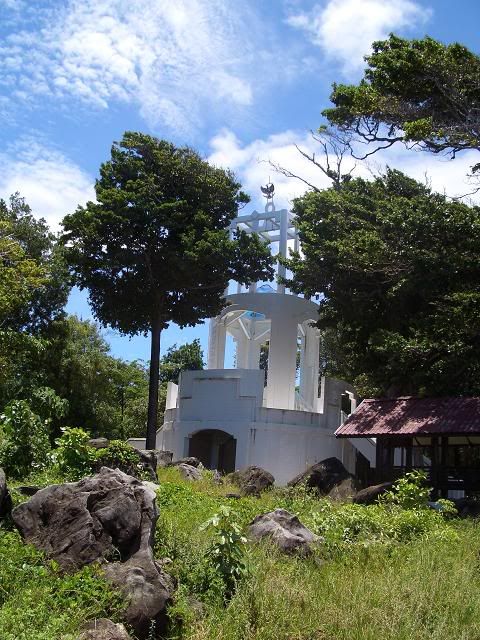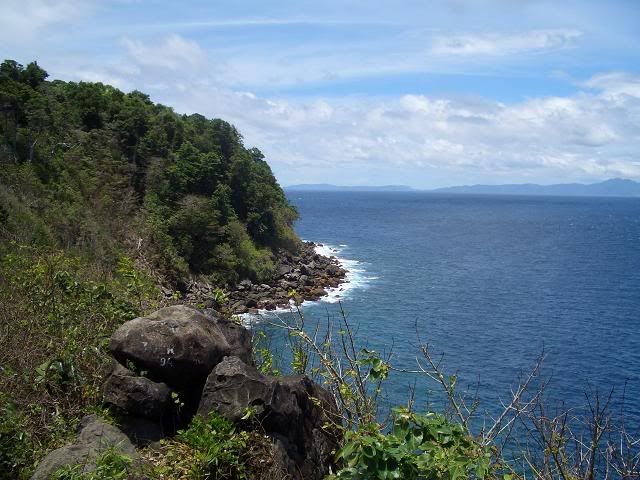









ZERO KILOMETER SABANG-INDONESIA
KILOMETER NOL SABANG-INDONESIA








ZERO KILOMETER REPUBLIC OF INDONESIA, SABANG-NAD
KILOMETER NOL REPUBLIC OF INDONESIA, SABANG-NAD
DARI SISI SEBELAH KIRI TUGU KILOMETER NOL REPUBLIK INDONESIA TERLIHAT PEMANDANGAN KE ARAH SAMUDERA HINDIA, DARI KEJAUHAN TERLIHAT PULAU BREUEH








JAKARTA, MARCH 13, 2008
Visit Indonesia Year?
(RACHMAD YULIADI NASIR,rbacakoran at yahoo dot com)
INDEPENDENT-What an unfortunate year for Indonesia's tourism industry. Less than one month after the government declared 2008 Visit Indonesia Year, flooding crippled Jakarta's Soekarno-Hatta International Airport, the main gateway to the country, early last month.
Last week, the second annual Travel & Tourism Competitiveness Report 2008, by the Geneva-based World Economic Forum, downgraded Indonesia as a tourist destination to 80th among 130 countries surveyed. That was much worse than its position last year, which was 60th out of 124 countries.
The report showed that Indonesia scored very poorly in health and hygiene due to an inadequate supply of hospital beds, poor access to sanitation and drinking water and an acutely low number of qualified physicians.
The country also performed badly in that other pillar of the tourism industry -- infrastructure. In fact, Indonesian airplanes have been banned from European airspace since last year and no progress has been made on getting this blanket ban lifted.
Indonesia scored high only in terms of natural resources, with several World Heritage natural sites and the richness of it flora and fauna, and price competitiveness. But these strengths were undermined by such major weaknesses as underdeveloped infrastructure, including air and ground transportation.
There are even great concerns related to safety, particularly the prevalence of road accidents.
No wonder Indonesia, though richly endowed with a wide variety of cultures and interesting sites, has remained among the least popular tourist destinations even in the Southeast Asian region, outranked by Malaysia, Singapore and Thailand. Last year, Indonesia received just around 5.5 million tourists, compared to more than 9 million arrivals in Malaysia and almost 20 million in Singapore.
The survey showed the top-ranked countries in the travel and tourism industry -- Switzerland, Austria, Germany, Australia, Spain, the United Kingdom, the United States, Sweden, Canada and France -- understand the importance of support businesses and regulatory frameworks, coupled with world-class transportation and tourism infrastructure and a focus on nurturing human and natural resources.
Countries have vastly different underlying operational conditions, depending on where they fall in the tourism development spectrum. All have unique tourism products to offer, but the central goal is to encourage improvement in the underlying competitive conditions and infrastructure.
This is again where Indonesia is fundamentally weak, even in nature-based tourism, where the country should have a strong comparative advantage.
This latest travel and tourism report from the World Economic Forum should serve as a strong wake-up call for us, especially the government, to reinvigorate the tourism industry, especially now in the midst of a weakening global economy and uncertainty in the international financial market.
International tourism is known as a resilient industry, never suffering a deep and lasting recession and able to recover quickly because the need to travel, whether for business or leisure, is so deeply ingrained in our societies.
As a resource-based industry, tourism is also an ideal business for Indonesia to develop because of its multiplier effect and the labor-intensive nature of its operations. It directly benefits local communities economically. Travel businesses do their best when they use the local workforce, services, products and supplies.
The tourism industry also supports the integrity of a place. Destination-savvy travelers seek out businesses that emphasize the character of a locale. Tourism revenue in turn raises the perceived value of those assets.
Travel-related businesses such as hotels, restaurants, transportation, handicrafts and cultural shows are all labor intensive, the very kind of enterprises needed to absorb the huge pool of job seekers here.
But it is precisely because of its multi-sectoral activities that the promotion of the tourism industry should involve not only the tourism ministry but all other state and private organizations that provide the basic infrastructure and public services, including immigration, customs, transportation, accommodation and security.
SABANG FROM AIR, YOU CAN SEE DANAU ANEUK LAUT-ANEUK LAUT LAKE, TELUK SABANG-SABANG BAY, PULAU KLAH-KLAH ISLAND, PULAU RUBIAH-RUBIAH ISLAND AND PULAU SEULAKO-SEULAKO.
UJUNG PULAU, TERDAPAT KILOMETER NOL, BILA MENGGUNAKAN TEROPONG TERLIHAT JUGA PULAU RONDO DI KEJAUHAN GARIS PANTAI YANG INDAH.
















RACHMAD YULIADI NASIR
Bank Muamalat Indonesia (BMI)Arthaloka : 913-22775-99
www.the-independent-news.blogspot.com
www.halamansatu.net/index.php?option=com_content&task=view&id=349&itemid=50












UJUNG PULAU, TERDAPAT KILOMETER NOL, BILA MENGGUNAKAN TEROPONG TERLIHAT JUGA PULAU RONDO DI KEJAUHAN GARIS PANTAI YANG INDAH.

CORAL REEF AT SEA GARDEN OF RUBIAH ISLAND-SABANG








RACHMAD YULIADI NASIR
Bank Muamalat Indonesia (BMI)Arthaloka : 913-22775-99
www.the-independent-news.blogspot.com
www.halamansatu.net/index.php?option=com_content&task=view&id=349&itemid=50










RACHMAD YULIADI NASIR
Bank Muamalat Indonesia (BMI)Arthaloka : 913-22775-99
www.the-independent-news.blogspot.com
www.halamansatu.net/index.php?option=com_content&task=view&id=349&itemid=50

















